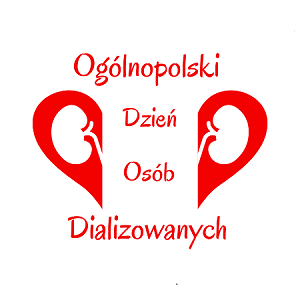The National Association of Dialysis Patients and partners inaugurate the National Day of Dialysis Patients.
8 November 2021 marks the first Polish celebration of the National Day of Persons on Dialysis. The establishment of the holiday is the result of a joint effort by organisations involved in nephrology care - the National Association of Dialysis Patients and the patient community. The aim of the initiative is first and foremost to draw attention to the problems and needs of dialysis patients and to raise awareness of the prevention and treatment of kidney diseases. The nationwide network of DaVita dialysis stations is proud to support this important initiative.
The choice of date is not accidental and emphasises that dialysis patients are alive thanks to the knowledge and work of others and the development of science. On 8 November 1958, the first haemodialysis in Poland was performed in Poznań. Before this major breakthrough in Polish medicine, people affected by chronic kidney disease (CKD), a condition that today leads patients to the dialysis chair and/or to the waiting queue for kidney transplantation, simply died prematurely.
- The announcement of the establishment of the National Dialysis Day is accompanied by our personal appeal for increased educational activities and real assistance that can improve the quality of life and facilitate the functioning of dialysis patients in society. It is also an expression of gratitude of dialysis patients to those who provide them with medical care and to their caregivers - says Iwona Mazur, President of the National Association of Dialysed Persons. - The idea for the holiday, moreover, came from the patients themselves associated on social media, including the 'I love my kidneys' support group. It quickly gained the approval of our organisation and we immediately took the steps at state level necessary to make it a reality - he adds.
- It is estimated that the problem of chronic kidney disease (CKD) affects up to 12-14 per cent of the Polish population, i.e. almost 4.5 million Poles. This illustrates the magnitude of the phenomenon - if left untreated, the condition may, in each affected person, lead to the need for renal replacement therapy (peritoneal dialysis or haemodialysis) or kidney transplantation. The key to effective prevention is the earliest possible detection of the disease, which makes it possible to delay its development for a few to several years and to continue a relatively normal life without, for example, having to give up work and a significant part of daily activities - explains Prof. Dr Beata Naumnik, regional consultant for nephrology, Head of the 1st Clinic of Nephrology and Transplantology with Dialysis Centre Medical University of Bialystok.
Dr Marta Serwańska-Świętek, MD, nephrologist, transplantologist and Deputy Medical Director of DaVita Polska, a network of dialysis stations that has supported the initiative, he adds: - In DaVita dialysis centres and nephrology outpatient clinics located throughout Poland, more than 3,700 dialysis patients are cared for by specialists - a significant group among all dialysis patients in Poland. Some of them come to us being previously unaware of the disease which has been developing in their organism for many years. And let us remember that even at an advanced stage, kidney disease may not give any clear symptoms; sick kidneys are said not to hurt. That is why prevention in the form of regular tests of creatinine concentration in blood and general urine tests, performed at least once a year, and if we suffer from other chronic diseases even more often, is so important. DaVita, by organising a nationwide educational and prophylactic action "Test your kidneys - save your life", makes its contribution to the dissemination of information on kidney diseases and the need for Poles to take care of their kidneys. We are happy to support further initiatives of this kind. We hope that the establishment of the National Dialysis Day will lead to greater awareness of the challenges of renal replacement therapy, as kidney disease can affect any of us.
The catalyst for the development of PChN, which, if untreated, leads over time to complete renal failure, are so-called co-morbidities, i.e. hypertension, diabetes or coronary artery disease.
Haemodialysis is a procedure to cleanse the blood of toxins and unnecessary metabolic elements and to remove excessive water accumulated in the body as a result of kidney malfunction. During haemodialysis, the patient's blood is repeatedly drawn into the dialyser (which is the key component of the apparatus, the so-called 'artificial kidney'), purified there and then transfused back into the circulatory system. There is an average of four to five litres of blood in the human body. During haemodialysis, approximately 300-400 ml remains outside the patient's body at any given time.
There are currently more than 20 000 people undergoing dialysis in Poland.
***
ABOUT THE SPA
The Polish National Association of Dialysis Patients was established in 2004. It has been gathering patients undergoing renal replacement therapy in dialysis centres in Poland for 18 years. Any citizen of the European Union may become a member of the Association, in particular persons undergoing dialysis, their families and caregivers, persons with chronic renal failure, persons undergoing renal transplantation and persons in predialysis. OSOD promotes the prevention of kidney disease, especially among those at risk, and the idea of transplantation as the best treatment for people with kidney failure. The association organises free prophylactic tests and open lectures on the prevention of PChN - all with the aim of stopping the spread of this civilisational disease, which affects approximately 12-14% of the population. For more information about OSOD - https://osod.info
About DaVita
DaVita sp. z o.o. is a division of DaVita Inc. a leading dialysis provider in the United States, caring for more than 205,000 patients in its home market. In Poland, DaVita is the second largest non-public network of dialysis stations, operating 66 facilities in large and small towns, treating approximately 3,700 patients. Diagnosis and consultations for kidney diseases and their treatment are carried out in 44 DaVita nephrology clinics throughout the country. DaVita in Poland employs more than 1,500 people. Globally, the company operates almost 3100 dialysis stations, 91 per cent of which are located in the USA. DaVita operates according to a mission: we build a community in which we care for each other and in which the patient and his or her needs always come first. For more than 20 years, the company has been a leader in the quality of clinical care and innovation in the treatment of patients with chronic kidney disease and end-stage renal disease. For more information about DaVita - www.DaVita.pl
NATIONAL DAY FOR DIALYSIS PATIENTS 8.11



